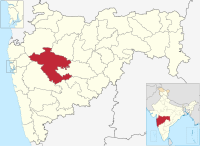Shrigonda
This article has multiple issues. Please help improve it or discuss these issues on the talk page. (Learn how and when to remove these messages)
|
Shrigonda, Maharashtra, India | |
|---|---|
city | |
| Coordinates: 18°36′58″N 74°41′53″E / 18.616°N 74.698°E | |
| Country | |
| State | Maharashtra |
| District | Ahmednagar |
| Government | |
| • Body | Municipal Council |
| Elevation | 561 m (1,841 ft) |
| Population (2011) | |
• Total | 31,134 |
| Languages | |
| • Official | Marathi |
| Time zone | UTC+5:30 (IST) |
| PIN | 413701 |
| Telephone code | 912487 |
| Vehicle registration | MH-16 |
| Website | www |
Shrigonda is a municipal council in Ahmednagar district in the Indian state of Maharashtra. The place is described as Santanchi Punyabhumi (Holy Land of Saints).
Historical monuments

The place consists of twelve shivalingas.
Mythology
Sheikh Muhammad lived and died here. Sheikh Muhammad was sufi philosopher.
History
This place has a long history tracing back to the 13th Century.[citation needed]. In the ancient time Shrigonda was known by the "Chambargonda". In the 17th century, during the Scindia regime about 208 acres (0.84 km2) of land was donated to Shri Hari Mahapurush, the 7th generation descendant of Shri Pralhad Maharaj Mahapurush. Shri Hari had only one son, Narayan. Narayan had three sons – Vishnu, Dattatraya and Gopal. Of the three, Dattatraya spent his life in Kirtan and Pravachan and enlightenment of Bhagwat Dharma. He was instrumental in starting a religious movement among the illiterate class and especially farmers of Shrigonda Taluka. There are over a lakh of his followers all over Maharashtra. After his nirvana in 1992, his followers contributed and built his Samadhi near the Samadhi of Shri Pralhad Raj and other ancestors. The sons of Vishnu,Dattatraya and Gopal devoted their time to Bhajans and Kirtans.
The Maratha nobleman Mahadji Scindia was resident of Shrigonda before he moved to North India and became Maharaja of Gwalior. His descendant Maharaja Jiwajirao Scindia donated palaces and land to Rayat Shikshan Sanstha which runs schools in rural areas of Maharashtra.
Rituals
Mohammad Maharaj Yatra
Shri Shaikh Mohammad Maharaj Samadhi is worshipped in the region. Hindus worship Mohamad Maharaj with Haldi and Kumkum. It is an example of Hindu-Muslim brotherhood. The Mohamad Maharaj Yatra is held for two days in the month of March when worshippers visit the temple-mosque. During the ceremony of applying Chandan (Sandalwood) paste to the Samadhi. This YATRA held on "AAMLAKI EKADASHI" i.e., on "Falgun Shukl-Paksh 11" of Hindu calendar.
Khandoba Yatra and Bhairoba Yatra
Khandoba Yatra and Bhairoba Yatra are the big events in the city after Mohammad Maharaj Yatra. The Shani temple and Jodhpurcha Maruti temple are quite old and are looked after by the Guravs who traditionally do the Pooja in here. Khandoba temple is outside the city on the bank of river Saraswati. Shrigondekar ( native of Shrigonda) worshiped the god Khandoba and Bhairoba on the occasion of the festival.
Salvandevi Yatra
Salvandevi Yatra is celebrated in Navratra. In the 9 days before Dashami, people visit the Salvandevi Temple located about 3 km. south of city.
Geography
Shrigonda is located at 18°36′58″N 74°41′53″E / 18.616°N 74.698°E.[1] It has an average elevation of 561 metres (1840 feet).
Demographics
As of 2001[update] India census,[2] Shrigonda had a population of 26,331. Males constitute 52% of the population and females 48%. Shrigonda has an average literacy rate of 71%, higher than the national average of 59.5%: male literacy is 77%, and female literacy is 64%. In Shrigonda, 12% of the population is under 6 years of age.
Transportation
The transport facilities have developed recently so mobility is increased. There is an ST stand with regular buses plying to Daund, Pune, Nasik, Jalgaon,Shirur, Jamkhed and Ahmednagar. With Railway connectivity to south and north side, goods transport is also easy. The nearest junctions are Daund and Ahmednagar; Pune and Manmad are the nearest rail junctions. There are 4 passenger stations in Shrigonda.
Politics
Shrigonda’s political atmosphere has always been very active revolving around prominent political figures like Shivajirao Nagawade, founder chairman of The Shrigonda Sahakari Sakhar Karkhana, Babanrao Pachpute, and Rahul Jagtap , a Member of the Legislative Assembly. However, Babanrao Pachpute, who was MLA for 35 years and Ex-Minister for many years has very strong hold on almost all panchayati Raj institutions. Other powerful political leader are Ghanshyam Shelar, Vice President of Nationalist congress Party. Babanrao Pachpute left Nationalist Congress party before few day of legislative assembly election 2014 and joined Baratiya Janata Party. He was said to had very close relations with NCP Supremos Sharad Pawar and Ajit Pawar. He contested the assembly elections and lost to Rahul Jagtap from NCP. In 2019 vidhansabha elections Babanrao Pachpute from BJP and Ghanshyam Shelar from NCP were the candidates and Ghanshyam Shelar lost to Babanrao Pachpute just with difference of 4700 votes.And this 2019 election was one of the eye-catching election.Another one of the powerful leader of Congress and Z P Vice president Recently, Manhor Pote (The Municipality Shrigonda) appointed as a BJP. Also there is the rise of second generation young politicians like Vikramshin Babanrao Pachpute, Rajendra Shivajirao Nagawade, Prashant Ghanshyam Shelar etc.
See also
References
- ^ Falling Rain Genomics, Inc - Shrigonda
- ^ "Census of India 2001: Data from the 2001 Census, including cities, villages and towns (Provisional)". Census Commission of India. Archived from the original on 16 June 2004. Retrieved 1 November 2008.


